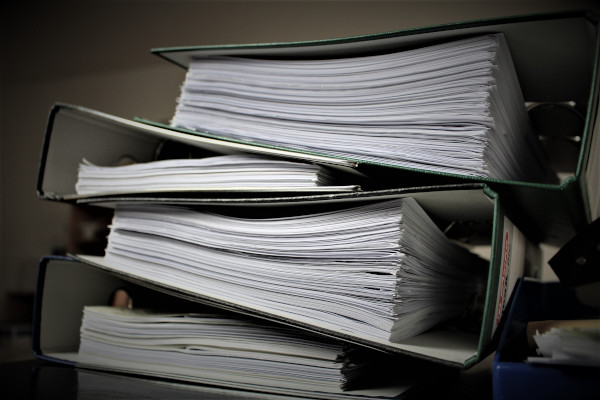This week I received an unusual amount of post. Yes, paper letters sent in the post still appear to be a thing. Who would have thought. You are right in thinking that by far the most of them are related to some sort of bureaucratic, admin or otherwise tax issue… because it’s always tax season somewhere.
So what to do?
Deal with it! That’s the only way to get through it. When paperwork arrives on your doorstep, you have a few ways of dealing with it. There good old fashioned procrastination, but this won’t get you far and the original issue will only come back bigger and badder to bite you later on.
You could wait until tomorrow because you are tired after a long day at work and I do understand that feeling all too well. After a long 12 hour shift on your feet, admin is the last thing on your mind.
Last but not least, you can open the letter, read it and think about your approach to the topic at hand. Mind you, the issue or topic here doesn’t even matter when I think about admin. All of these pesky little things can grow into big issues if not addressed in a timely manner. So: deal with it.
Why?
If admin feels like this big burden, it does so because it is. Often, paperwork (including the digital variety) is often put in place to make life harder for you. As an example, think of insurance forms and contracts. No insurance provider will ever close a contract with you without knowing that they will make money off you. They are experts at estimating what they need to charge you so that they will not ever lose out. That’s their business model. The same is true of governments and taxes; of universities and their fees; of your entertainment provider and your online subscription. It is really hard to deal with it and often takes a long time.
That is exactly the reason why you should be on top of your paperwork and always knowing where you are at. It benefits you!
It benefits you and it benefits your wallet.
It benefits your wallet because if you never fall in arrears, you will never need to pay late payment fines. In addition, if you sit down and have a clear overview over your finances, you may find that it is cheaper to save up for a rainy day fund for when the boiler breaks instead of having super expensive home insurance. Be honest to yourself: when have you done this calculation the last time?
As a rule, I calculate insurance cost and compare to the cost of new appliances etc every time I move (about every 4 years). So far, I have saved approximately $200 per year in home insurance just because I found out that a new boiler was cheaper than insuring – if you think 5 years ahead. That is when I started my rainy day fund. Instead of paying into the pockets of insurers, I paid into my own account (separate from every day spending) and now have enough saved up to replace pretty much the entire contents of my flat. Mind you, I’m not rich and don’t own a lot.
The other main reason is that it benefits your state of mind. Knowing that you are on top of everything gives you peace of mind, reduces stress and (some say) helps you sleep better. In addition, having a good filing system (online as well as offline) means you never stress or waste time finding the important document you need. You are more likely to have a clean desk which in turn has been found to reduce stress.
How and where to start?
First up: if there are any legal procedures you are involved in (never mind in which capacity), these have to be dealt with immediately. Read through the paperwork so you know what is expected of you and when. Don’t let it slide. If need be, get help.
Second: Urgent issues like replacing the broken boiler are dealt with immediately. Don’t waste time on whining or complaining – simply fix it. That is what the rainy day fund is all about. Get things fixed so I can focus on my life.
Next, you need an overview of where you are at. What issues are outstanding? What renewals are coming up? Which ones are late? How much do you pay for everything.
Once you have an overview and know the size of the task at hand, prioritize the individual tasks and work through them methodically. Most important one first, then the next one and so on. In my case, I often put tax matters on top since they are the most impactful item in my life. As long as my taxes are reported and paid on time, I generally don’t have a lot of other important items. Being on top of my finances in terms of knowing how much comes in and how much goes out on a regular basis, is my second most important item. Then come renewals of all sorts, monthly bills etc.
Last and (nearly) most importantly: it needs to become a habit!
Opening the post, email or phone message immediately and reading through the first time is of paramount importance. Read it a second time and if it’s something easy, simply go and do it. Then file the incoming message, file your response and sit back knowing that this task if off your to do list.
If the paperwork takes more time to digest then please take the time to think about an appropriate response. Ideally, you will take a decision on how to respond with a calm mind rather than shoot from the hip. Always be mindful that reacting without thinking can backfire. Still, you need to respond and I generally set Wednesday evening aside to deal with more complex issues. Having a specific time slot in my diary set aside for it, I never feel like I don’t have time to deal with it. It also means that I can reach out for help and receive a response before the weekend. Again, it’s my way of taking pressure off important admin tasks in order to reduce stress.
If you have old paperwork collecting dust in a corner or a myriad of emails that need to be dealt with, then the same process applies:
1. Get an overview over how many outstanding admin tasks
2. Prioritize the tasks appropriately
3. Take action on each task until you are through it all
Once you are done working through the heap of paperwork, do everything you can to turn it into a habit. You can do 30 minutes a day or one evening every week or (shame on me) every Saturday and Sunday afternoon until you are at the bottom of the pile and all your paperwork is caught up.
Whatever works for you to turn admin into a habit, do it. You may even try different approaches until you find what works for you. The important thing is not to stop and to keep at it. You will get there in good time.
What to expect as result
Ever since I started to make a conscious effort to be on top of paperwork, I’ve noticed that my life is calmer. There is a lot less drama, no tight deadlines to get something done just in the nick of time. It is generally a lot more peaceful.
Furthermore, I don’t stress anymore. If my housing agency manager tries to bully me into changing the agreement, I know the details of the existing contract, my rights as a “customer” and where to find help against his tactics. Easy. All the paperwork is ready and lined up. Freedom!
It was a long journey and I am glad that I started with small actions which over time formed into good habits and have help me save time, money and reduce stress. I recommend you try it too and see how you get on.
Which good habit will you start with today?



